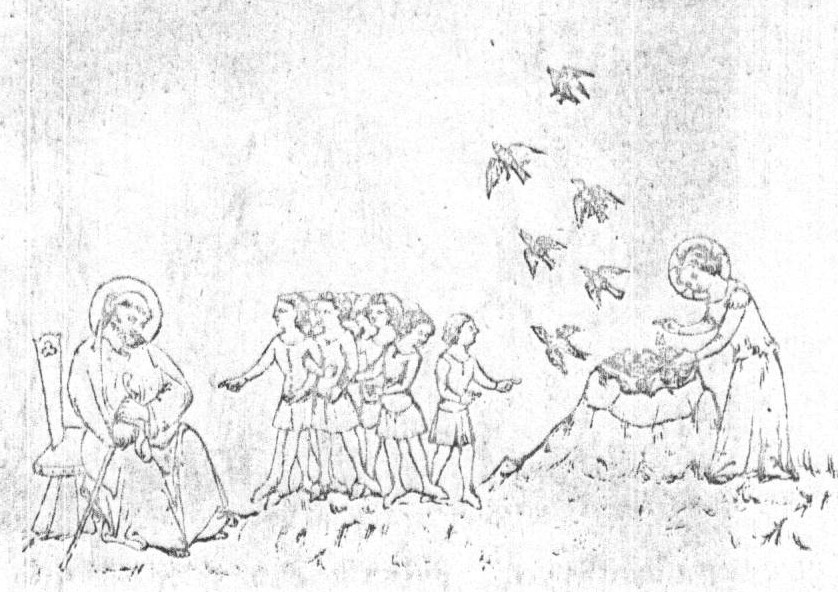i. the virgin birth
ii. miracles such as healing the blind and bringing people back from the dead
iii. the ascension to Heaven but not the crucifixion
iv. Jesus talking in the cradle and bringing clay birds to life
 |
| Jesus bringing the clay birds to life - as mentioned in the Qur'an |
Muslims talk of the "importation of paganism" by the Christians who have "gone astray". I, and quite a few modern theologians, would suggest that the Christ myth is paganism tacked onto monotheism. The Qur'an contains many references to what I would consider to be the pagan (or simplisticly naive) beliefs of Christianity, and therefore any religion (like Islam) that asks its followers to believe in the literal truth of these (to me) obviously copied stories must also be false. (As a matter of interest, is it simply the trinity and attendant beliefs in the Eucharist that Muslims consider to be the pagan imports?)
Let's take each of the above points and see if there is evidence that might lead a dispassionate, objective, intelligent person to at least suspect that there is something fishy going on...
1. the virgin birth
Not a new one this. Just about any man-god who wanted to be taken seriously has claimed a virgin birth for himself: Mars fathering Romulus with the vestal virgin; Augustus (miraculous conception after Apollo and his mum Atia got together); Alexander the Great, Buddha...Virgin birth seems pretty pagan to me, and yet there it is in the Qur'an!
2. healing, curing blindness, raising the dead
Again, there is an embarrassing super-abundance of such stories. Let's take just a couple of examples. One we know is a con because we have a first-hand testimony by a witness called Lucian of Samosata. In around AD 100-50 a chap called Alexander invented a religion in which a new God called Glycon came to Earth (miraculously) as a fulfilment of divine prophesy (aren't they always?), healed the sick and raised the dead. Or how about Apollonius of Tyana who had a miraculous birth (again...) cast out demons, healed the sick, raised the dead, gathered disciples... It was going on ALL THE TIME. So such stories seem pretty pagan to me, and yet there it is in the Qur'an!
3.The ascension to Heaven
Ascension myths are present in lots of ancient religions. I won't bore you again with the gnostic heresy that was prevalent in the area that Mohammad was teaching in at the time. Suffice to say there are some very interesting parallels.
4. Jesus talking in cradle and bringing clay birds to life
The Gospel of Pseudo Matthew and the Infancy Gospel of Thomas were, it seems to me, the sources for the stories in the Qur'an relating to the infancy of Jesus. They contain much more detail of the same stories and were written, scholars believe, to flesh out the details of Jesus' early life for naive Christians. No Christian theologian, as far as I am aware, would believe they have any worth other than as historic curiosities and yet the stories appear in the Qur'an.
In addition the Injilu 't Tufuliyyah or the Gospel of the Infancy of Jesus Christ contains an Arabic translation of the Infancy Gospel of Thomas which contains a story of the infant Jesus talking: Jesus spoke when he was in the cradle, and called out to his mother Mary:— "Verily I am Jesus, the Son of God, the Word, whom thou hast given birth to according to the good tidings given thee by the Angel Gabriel, and my Father hath sent me for the Salvation of the World."
(The Infancy Gospel of Thomas is a pseudepigraphical gospel about the childhood of Jesus that dates to the 2nd and 3rd centuries. It was part of a popular genre of biblical work, written to satisfy a hunger among early Christians for more miraculous and anecdotal stories of the childhood of Jesus than the Gospel of Luke provided.)
Here is what the wikipedia entry has to say about the Infancy Gospel of Thomas:
The text describes the life of the child Jesus, with fanciful, and sometimes malevolent, supernatural events, comparable to the trickster nature of the god-child in many a Greek myth. One of the episodes involves Jesus making clay birds, which he then proceeds to bring to life...
And yet Muslims accuse Christians of importing pagan myths!
How do Muslims explain the similarities of the Qur'anic stories of Jesus with these texts?
No comments:
Post a Comment